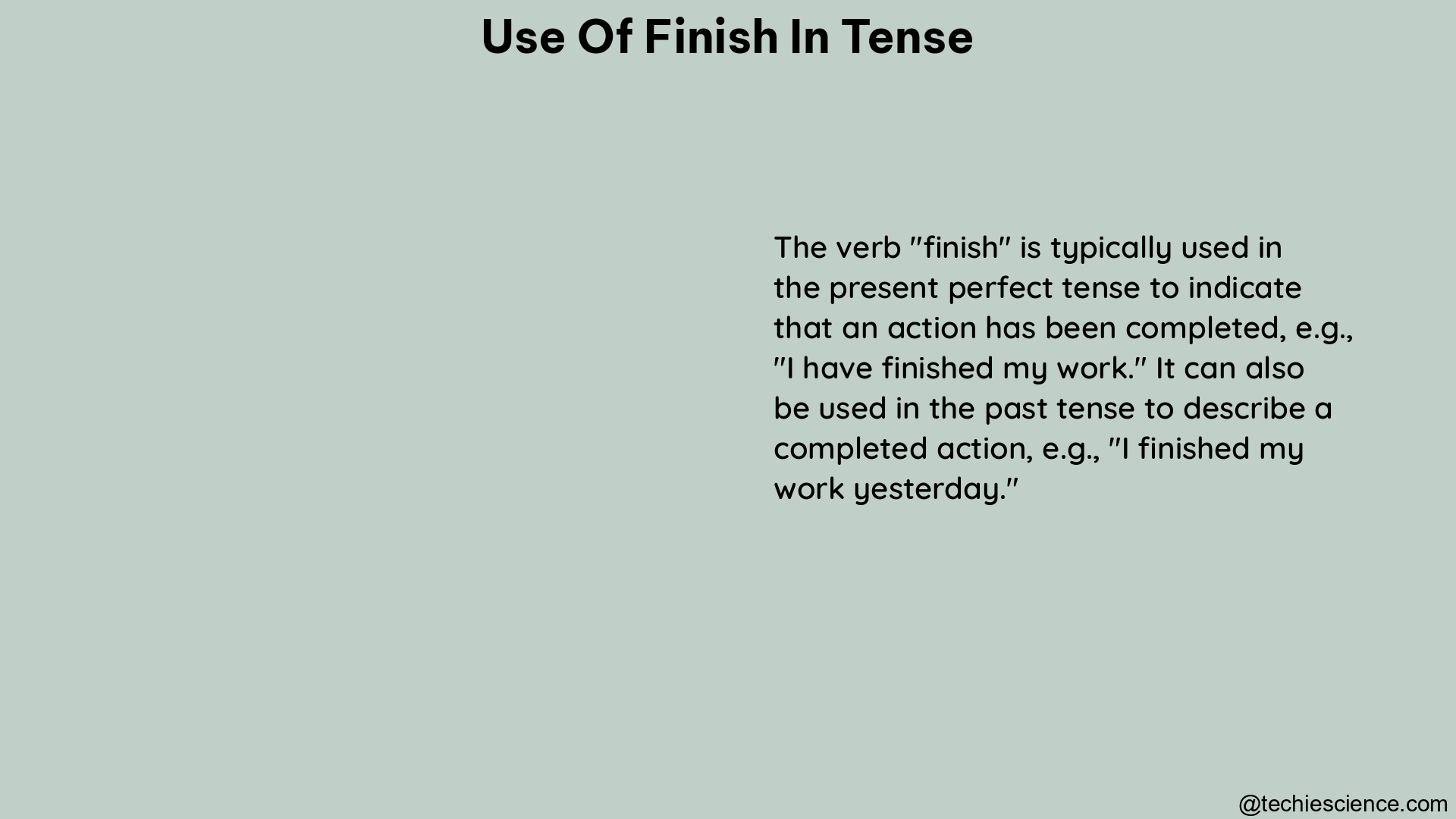The verb “finish” is a commonly used word in the English language, but its proper usage in different tenses can be a source of confusion for many learners. This comprehensive guide will delve into the intricacies of using “finish” in various tenses, providing you with a deep understanding of its grammatical specifications and how to employ it correctly in diverse contexts.
Present Tense
Simple Present
The simple present tense of “finish” is used to describe actions that occur regularly or are true in general. It conveys a sense of habitual or routine actions.
Examples:
– “I finish my homework every day.” (Regular action)
– “She finishes her coffee quickly every morning.” (Regular action)
Present Progressive
The present progressive tense of “finish” is used to describe actions that are ongoing at the moment of speaking. It emphasizes the current, continuous nature of the action.
Examples:
– “I am finishing my project.” (Ongoing action)
– “They are finishing their exams.” (Ongoing action)
Past Tense

Past Simple
The past simple tense of “finish” is used to describe completed actions in the past. It indicates that the action has been fully accomplished.
Examples:
– “I finished my degree last year.” (Completed action)
– “They finished their project on time.” (Completed action)
Past Progressive
The past progressive tense of “finish” is used to describe actions that were ongoing at a specific point in the past. It highlights the continuous nature of the action during a particular time frame.
Examples:
– “I was finishing my homework when you called.” (Ongoing action in the past)
– “They were finishing their dinner.” (Ongoing action in the past)
Perfect Tenses
Present Perfect
The present perfect tense of “finish” is used to describe actions that started in the past and continue to have an impact on the present. It connects the past to the present.
Examples:
– “I have finished my degree, so now I’m looking for a job.” (Action started in the past, relevant to the present)
– “By the time she arrived, we had already finished the project.” (Action started in the past, relevant to the present)
Past Perfect
The past perfect tense of “finish” is used to describe actions that were completed before another action in the past. It establishes a chronological order of events.
Examples:
– “I had finished my degree before I got married.” (Action completed before another action in the past)
– “By the time she arrived, we had already finished the project.” (Action completed before another action in the past)
Future Perfect
The future perfect tense of “finish” is used to describe actions that will be completed by a specific future time. It anticipates the completion of an action in relation to a future point.
Examples:
– “By next week, I will have finished all my exams.” (Action will be completed by a specific future time)
– “The book will have been finished by the author in December.” (Action will be completed by a specific future time)
Passive Voice
Present Passive
The present passive voice of “finish” is used to focus on the action or object rather than the performer. It emphasizes the process or result of the action.
Examples:
– “The project is being finished by the team.” (Focus on the action)
– “The cake is being finished by the children.” (Focus on the action)
Past Passive
The past passive voice of “finish” is used to describe completed actions in the past, focusing on the action or object. It shifts the attention from the doer to the action itself.
Examples:
– “The project was finished by the team.” (Completed action in the past)
– “The cake was finished by the children.” (Completed action in the past)
Common Mistakes
-
Misuse of Forms: Confusing the past simple form ‘finished’ with the past participle form, which is also ‘finished.’
Example: Incorrectly saying ‘I have finish my work’ instead of ‘I have finished my work.’ -
Omitting Auxiliary Verb: Omitting the auxiliary verb when using the past participle form in perfect tenses.
Example: Incorrectly saying ‘I finished my homework’ instead of ‘I have finished my homework.’ -
Incorrect Forms: Applying the rule of adding -ed to irregular verbs.
Example: Incorrectly saying ‘goed’ instead of ‘went’ (past simple) and ‘gone’ (past participle) for the verb ‘go.’
By understanding the nuances of using “finish” in different tenses, you can effectively communicate your ideas and avoid common grammatical errors. Remember to pay close attention to the specific contexts and requirements of each tense to ensure accurate and natural-sounding English.
Reference:
1. https://english.stackexchange.com/questions/512237/can-i-use-the-verb-finish-in-present-continuous-tense
2. https://www.wordhippo.com/what-is/the-past-tense-of/finish.html
3. https://promova.com/past-tense-of/finish

Hi…. I am Goutam Datta. I have completed a double M. A. in English and B. Ed. I am a creative writer. Currently, I am a part of the LambdaGeeks.